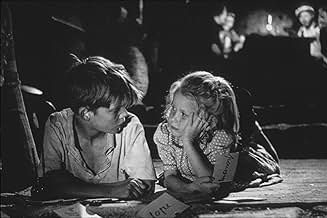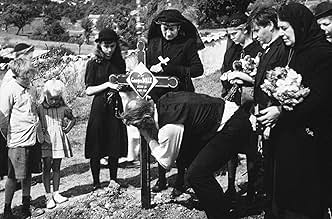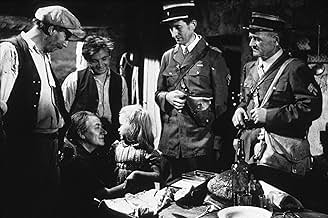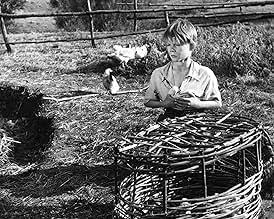IMDb-BEWERTUNG
8,0/10
13.515
IHRE BEWERTUNG
Ein junges französisches Mädchen, das bei einem Luftangriff der Nazis zum Waisenkind geworden ist, ist mit dem Sohn eines armen Bauern befreundet. Gemeinsam versuchen sie sich mit der Realit... Alles lesenEin junges französisches Mädchen, das bei einem Luftangriff der Nazis zum Waisenkind geworden ist, ist mit dem Sohn eines armen Bauern befreundet. Gemeinsam versuchen sie sich mit der Realität des Todes auseinanderzusetzen.Ein junges französisches Mädchen, das bei einem Luftangriff der Nazis zum Waisenkind geworden ist, ist mit dem Sohn eines armen Bauern befreundet. Gemeinsam versuchen sie sich mit der Realität des Todes auseinanderzusetzen.
- Für 1 Oscar nominiert
- 8 Gewinne & 2 Nominierungen insgesamt
Marcel Mérovée
- Raymond Dollé
- (as Pierre Merovée)
Denise Péronne
- Jeanne Gouard
- (as Denise Perronne)
Marie-Pierre Casey
- Infirmière
- (Nicht genannt)
André Enard
- Le premier gendarme
- (Nicht genannt)
Marcelle Feuillade
- La mère de Paulette
- (Nicht genannt)
Roger Fossey
- Le père de Paulette
- (Nicht genannt)
Handlung
WUSSTEST DU SCHON:
- WissenswertesIn a television interview ("Vivement Dimanche Prochain", France 2, 17 April 2005) Brigitte Fossey, who played the little Paulette, revealed that the film had originally been shot as a short, and then it was later decided to extend it into a feature film. Unfortunately she had lost her milk teeth and Georges Poujouly (who plays the boy Michel) had had his hair cut to play in Wir sind alle Mörder (1952). So, in many scenes of the movie Paulette has false teeth and Michel is wearing a wig.
- PatzerThe poor parents are killed by a Focke-Wulf 190. This kind of plane didn't exist at the moment of the "battle of France" in May and June 1940.
- Crazy CreditsThere are two alternate opening credits:The main credit starts with a story book and a female hand opens the book to reveal the credits. The alternate still has the same book but this time we are introduced to the two main characters who are sitting by a lake. In this version, Michel's hand is turning the page and in between the scenes he tells Paulette that he's going to tell a story.
- VerbindungenFeatured in Le ciné-club de Radio-Canada: Film présenté: Jeux interdits (1959)
Ausgewählte Rezension
This great film has been well-described here and elsewhere, and I don't know that there's a lot more to be said about its worth. It made a great impression on me when I first saw it in an English-dubbed version on late night TV many years ago, and it has always been a favorite of mine since then.
But it seems there's often a bit more to learn about an old favorite film. In this case, I acquired a foreign DVD edition of "Les Jeux interdits" which contained, besides some interesting outtakes, a later-deleted prologue and epilogue to the film which I had never heard of before. These did not have English subtitles, so I had to guess what was being said, but Clement's direction and the acting of young Fossey and Poujouly are so good that I could follow almost all of it without knowing very much French at all. They establish a sort of framing device for the story, in that the plot of the film is in fact a story from a book being read by the boy to the girl. In the prologue we see Fossey and Poujouly, not dressed in grimy peasant clothes at all, but clean, scrubbed, and in their Sunday-best, sitting on a log over a stream. The boy begins reading the story of Paulette and Michel out of the book, and we fade into the film as we now know it, beginning with the refugees on the road. After the sad ending of the story, we fade back to the epilogue, where the boy has just finished reading. The heartbreaking ending of the story has the girl in tears of despair. So the boy, in an act of kindness to her, pretends to read a blank page at the end of the book and makes up a happy ending to the story to dispel her grief.
I guess I can see why it might have been deleted later, as it tends to soften the force of the central narrative a bit and the devastating sadness of its ending. But it really is a beautiful and touching bit of film, and I'm very happy to have a chance to see it, as I don't think it's been seen much over the years, or that many fans of this film are even aware of it.
The outtakes are quite interesting as well, as they show some alternate takes of familiar scenes, including the snapping of that little blackboard thing with the title of the film at the start of the shots (what's that thing called, anyway?). There is also some footage of the old owl in the rafters of the mill, in which you can occasionally see Clement coming into the frame to turn the owl's head around toward the camera when it keeps turning away.
With or without the missing prologue and epilogue this is a great masterpiece that you should experience.
But it seems there's often a bit more to learn about an old favorite film. In this case, I acquired a foreign DVD edition of "Les Jeux interdits" which contained, besides some interesting outtakes, a later-deleted prologue and epilogue to the film which I had never heard of before. These did not have English subtitles, so I had to guess what was being said, but Clement's direction and the acting of young Fossey and Poujouly are so good that I could follow almost all of it without knowing very much French at all. They establish a sort of framing device for the story, in that the plot of the film is in fact a story from a book being read by the boy to the girl. In the prologue we see Fossey and Poujouly, not dressed in grimy peasant clothes at all, but clean, scrubbed, and in their Sunday-best, sitting on a log over a stream. The boy begins reading the story of Paulette and Michel out of the book, and we fade into the film as we now know it, beginning with the refugees on the road. After the sad ending of the story, we fade back to the epilogue, where the boy has just finished reading. The heartbreaking ending of the story has the girl in tears of despair. So the boy, in an act of kindness to her, pretends to read a blank page at the end of the book and makes up a happy ending to the story to dispel her grief.
I guess I can see why it might have been deleted later, as it tends to soften the force of the central narrative a bit and the devastating sadness of its ending. But it really is a beautiful and touching bit of film, and I'm very happy to have a chance to see it, as I don't think it's been seen much over the years, or that many fans of this film are even aware of it.
The outtakes are quite interesting as well, as they show some alternate takes of familiar scenes, including the snapping of that little blackboard thing with the title of the film at the start of the shots (what's that thing called, anyway?). There is also some footage of the old owl in the rafters of the mill, in which you can occasionally see Clement coming into the frame to turn the owl's head around toward the camera when it keeps turning away.
With or without the missing prologue and epilogue this is a great masterpiece that you should experience.
Top-Auswahl
Melde dich zum Bewerten an und greife auf die Watchlist für personalisierte Empfehlungen zu.
- How long is Forbidden Games?Powered by Alexa
Details
- Erscheinungsdatum
- Herkunftsland
- Offizieller Standort
- Sprache
- Auch bekannt als
- Forbidden Games
- Drehorte
- Produktionsfirmen
- Weitere beteiligte Unternehmen bei IMDbPro anzeigen
Box Office
- Bruttoertrag in den USA und Kanada
- 19.889 $
- Eröffnungswochenende in den USA und in Kanada
- 4.316 $
- 26. Apr. 2015
- Weltweiter Bruttoertrag
- 19.889 $
- Laufzeit1 Stunde 26 Minuten
- Farbe
- Seitenverhältnis
- 1.37 : 1
Zu dieser Seite beitragen
Bearbeitung vorschlagen oder fehlenden Inhalt hinzufügen

Oberste Lücke
By what name was Verbotene Spiele (1952) officially released in India in English?
Antwort

























